Click Here to Download PDF Version

Telehealth Newsletter
Official Newsletter of Tamil Nadu Chapter of Telemedicine Society of India
| What is New?
Launch of Telehealth Diabetes Online Course by TSI In its pursuit to promote telehealth training, Telemedicine Society of India has been conducting training for telemedicine since April 2020. On the 30th July, during the 8th Edition of Dr. Mohan’s International Diabetes Update, the society launched Telehealth Diabetes online course for medical practitioners. This is the second online course on Telemedicine launched this year by TSI. The course has interactive video lectures, power-point presentations and theory material and is divided into four broad segments as follows: Module I- Introductory Primer to Tele-Diabetes The total duration of this online course is four to six hours with post course assessment to get a proficiency certificate of completion of the course. The specialist course faculty include – A short video of the course is included below. Those interested in taking up this course please click on the link below – Thank You. |
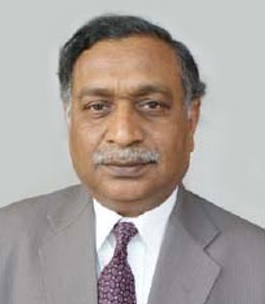 Webinar on ‘Ethical Issues in Telehealth Practice’
Webinar on ‘Ethical Issues in Telehealth Practice’
Dr. S. K. Mishra
Sanjay Gandhi Post Graduate Institute of Medical Sciences, Lucknow.
SGPGIMS has been conducting seminars on various aspects of healthcare and medical ethics. On August 14th, 2021, another program in this series was conducted through Videoconferencing on Ethical Issues in Telehealth Practice’. Telehealth is one of the evolving information technologies and COVID-19 pandemic has accelerated the use of telehealth globally. Telehealth can help decrease the burden of the healthcare system to a large extent. Prof R K Dhiman, Director, SGPGIMS, welcomed the participants and said that SGPGIMS has been a front-runner in establishing Telemedicine services not only for the Institute but also all over the country. He shared his experiences and informed that telemedicine is an important modality in patient care. Prof Vinita Agrawal, faculty in charge Bioethics cell SGPGI and moderator of the program, said that telehealth services can now aim not just for ‘sick care’ but also for ‘health care’. However, certain ethical concerns need to be understood for the use of this important technology as a means to improve access and quality of healthcare for all members of our society.
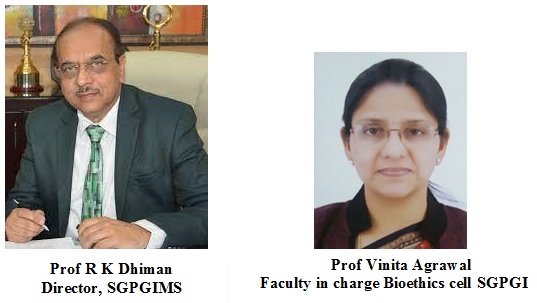
Prof S K Mishra, ICMR, Emeritus Scientist at the School of Telemedicine and Bioinformatics, SGPGIMS, who established the SGPGI telemedicine training and research facility, introduced the speakers and discussed the ethical aspects in Telemedicine. Dr Sunil Shroff, Managing Trustee of the MOHAN Foundation, a NGO that pioneered organ donation in India, talked about the scope of Telehealth and informed that the Telemedicine practice guidelines of the MoHFW discuss and cover the various ethical issues related to the use of telemedicine. Dr K Ganapathy, from the Apollo Telemedicine Network Foundation, said that the man behind the technology is more important and emphasized the need of maintaining standard of care and webside manners. Dr BN Mohanty, Honorary Advisor on Telemedicine to the Govt. of Odisha, talked about the responsibility of stakeholders to facilitate Ethical practice of Telehealth. The participants joined the program from within the institute and from the NMCN network. It was also streamed on YouTube.
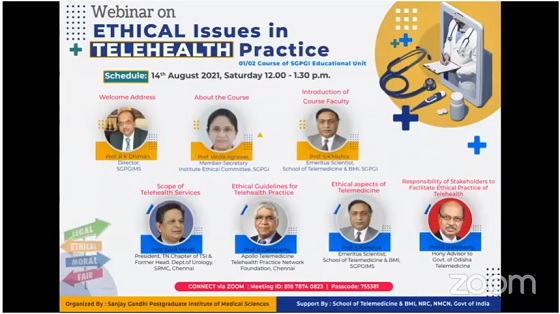
 Confidentiality and Data Protection in Telemedicine
Confidentiality and Data Protection in Telemedicine
Anay Shukla
Founding Partner, Arogya Legal – Health Laws Specialist Law Firm
Eshika Phadke
Associate, Arogya Legal – Health Laws Specialist Law Firm
As a concept, doctor-patient confidentiality is well established and widely understood by the medical fraternity. The principle, which is laid down in the MCI Code of Ethics, 2002 and the declaration that doctors take at the time of registration, also forms a part of the Charter of Patient Rights.
A doctor is duty-bound to maintain all information that a patient shares with him/her in utmost confidence irrespective of whether it pertains to their medical treatment itself or to their personal or domestic lives. The exception, of course, is when the doctor is of the opinion that keeping the information confidential would cause harm either to a specific person or society at large. This obligation has been explicitly adopted under the Telemedicine Practice Guidelines. While confidentiality has evolved to cater to telemedicine, it is still intuitive for doctors. However, data protection, which in the digital age goes hand in hand with confidentiality, is a new compliance for doctors.
The information that is collected in the course of a medical consultation (online or in-clinic), procedure, pathology or diagnostic test is recognised as “sensitive personal information” under the Indian data protection laws. This includes cases notes, test reports, diagnostic images, recordings, etc. Protecting this data has always been of utmost importance since a data breach would result in confidentiality being compromised. With the changes in the delivery of medical services, the responsibility of ensuring that the data is properly protected no longer vests only with the hospital administration.
The Telemedicine Practice Guidelines explicitly specify that doctors are required to comply with the data protection law, namely the Information Technology (Reasonable Security Practices and Procedures and Sensitive Personal Data or Information) Rules, 2011. While this may sound overwhelming, it is actually quite straightforward. The law merely expects that a person, in this case the doctor, takes reasonable actions and adopts appropriate systems to ensure that the data that they collect is with the consent of the person (i.e. the patient) and is protected. With clinics and telemedicine platforms becoming a lucrative target for cyberattacks, it is especially important to be cognisant of the best practices. The extent to which a doctor would need to be involved with data protection would vary.
All doctors who are offering teleconsultations in their individual capacity are responsible for ensuring compliance. First and foremost, their devices and browsers should be protected by a security software. If they are offering consultations via third-party text-based services, or video calling services, they must ensure that the service provider’s terms and conditions do not prohibit the use of the platform for telemedicine. If the consultations or information exchange is taking place via email, they must ensure that their email provider is reliable, that they use a strong password for the account and do not allow anyone else to access it. If the doctor offers consultations through their own website, they must ensure that suitable data protection systems are built in, and that they have a clear policy on the website outlining how the data is handled.
If a doctor is consulting through a telemedicine platform/aggregator or a hospital’s telemedicine services, it is most likely that the platform itself is looking into data protection. In such cases, the doctor should familiarise themselves with any restrictions that the platform may have placed to ensure patient data is protected. For example, several platforms prohibit doctors from storing patient records locally on their device and require that everything be stored on the platforms’ servers. Doctors should strictly comply with these restrictions, since failure to do so would weaken their defence in the event that a data breach occurs.
Remember that a doctor will not be held responsible for a breach of confidentiality, provided that he/she can prove that the breach of confidentiality was the result of a technological failure or the wrongdoings of a person other than the doctor. The caveat is that the doctor should be able to show that he/she has done their due diligence while selecting the technology service to use.
The takeaway is that prior to registering with a provider (which could range from a simple chat service provider to a dedicated telemedicine platform), the doctor should read the privacy policy to ensure that the data is being suitably handled to minimise the risk of data breaches.
References:
- Indian Medical Council (Professional Conduct, Etiquette and Ethics) Regulations, 2002
- Telemedicine Practice Guidelines, 2020
- Charter of Patient Rights (adopted by the National Human Rights Commission)
- Information Technology (Reasonable Security Practices and Procedures and Sensitive Personal Data or Information) Rules, 2011
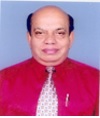 ISRO’s contribution for Indian Telemedicine Program from Concept to completion – Towards National Adaptation
ISRO’s contribution for Indian Telemedicine Program from Concept to completion – Towards National Adaptation
Dr. L.S.Satyamurthy
Former Program Director, Telemedicine, ISRO.
Preamble
It was in November 2001 when I had just returned to India completing my Diplomatic assignment as Counselor of Space, Science and technology, at the Embassy of India, Washington D.C, USA. The then Chairman of ISRO, Dr.K.Kasturirangan called me and said “there is talk of technology and benefits of telemedicine services in the advanced countries like US, Europe, Russia and Japan and they have already initiated the Telemedicine programs. NASA and ESA have started projects which was a part of Space Medicine program for the benefiting the public at large and we at ISRO should not lag behind. As the Indian Space program is basically an application-oriented program for national development and as we are the custodians Satcom technology, we should move forward immediately and take up the challenge of ushering health care for the remote, distant and underserved rural population of our country through the power of Telemedicine using Satellite communication. “That was the beginning of the momentous Telemedicine/Tele health movement in India and rest is history”.
The daunting task of Telemedicine Program conceptualization, formulation and implementation in India was primarily spearheaded by the Indian Space Research Organization ( ISRO ) along with the support of some Govt and private hospitals, dedicated Doctors, Technologists, State governments and Health Administrators. The Telemedicine being new and a technology-based healthcare delivery system, the challenges for implementation and adaptation needed to be comprehensively addressed since the health care in India is a State subject whereas Central government being for national policies and funding.
Beginning
ISRO initiated Telemedicine program under Space Technology applications for societal benefits in the year 2001 adopting multipronged strategy of addressing some of the important issues like:
- Resistance to change to new system of functioning and lack of infrastructure
- Technology adaptation and evolving National Standards for Telemedicine practice
- Creating awareness among Public, Doctors, Hospitals and Health administrators
- Judicious application of Telemedicine technology at appropriate levels of healthcare system
- Cost of service vis-à-vis affordability,
- Sensitivity to fast changing technology and its obsolescence,
- Training aspects for Doctors/ paramedics in the usage of the new technology in Medical care
- Evaluation of Telemedicine service and community satisfaction.
The Telemedicine pilot project era started by ISRO in 2001 culminated into operationalization of telemedicine network in different states of our country during the year 2005-2008. The important factor of providing satellite connectivity free of charge by ISRO, Govt of India was the major boon for many of the specialty hospitals and state governments hospitals to come together in providing health care service through telemedicine for the benefit of rural and underserved population.
Telemedicine Implementation
ISRO’s Telemedicine network covered several states of J&K, Karnataka, Kerala, Maharashtra, TN, AP, Orissa, Jharkhand, Rajasthan, Gujarat, Chhattisgarh, MP, Punjab, Haryana, Uttarakhand, Jammu, Kashmir, Ladakh and North eastern states; UT of Andaman, Lakshadweep Pondicherry, Diu, Daman and Sylvasa connected to50 Specialty/Medical college Hospitals.
That was how ISRO started implementing the Telemedicine program during 2001 -2008 with the assistance of several medical institutions namely: AIIMS Delhi, SGPGI Lucknow, PGI Chandigarh, JIPMER Pondicherry, SRMC Chennai; Several State govt District/Taluk hospitals all over the country including North eastern states, Jammu, Kashmir and Ladak and Union territories of Andaman and Lakshadweep ; specialty hospitals like , Jayadeva Institute of Cardiology, Narayana Hrudayalaya, Sathya Sai and Fortis hospitals in Bangalore; Apollo, Shankara Netralaya, SRMC, Mohan Diabetic foundation at Chennai, Aravind Eye care and Meenakshi hospitals clinics in Madurai and Coimbatore, LV Prasad Eye care in Hyderabad; Amritha institute, Kochi; KEM, Tata Memorial Cancer Centre and Nanavathi hospital in Mumbai, Gangaram and Safdarjung Hospital in Delhi ; Armed Forces medical hospitals at he forward areas including Srinagar, Uri, Udhampur Kargil and Parthapur (Siachen) connected to R & R hospital Delhi and some of the IAF regional hospitals linked to Command hospital, Bangalore.
Further, ISRO provided the assistance for setting up of Telemedicine center at Kabul in Afghanistan under WHO sponsorship and at Male in Maldives under MEA sponsorship.
During the Tsunami in 2005, ISRO’s Telemedicine network provided the Satcom link for Andaman and Nicobar Islands were provided for both Telemedicine service and telecom support for connecting the mainland of India. ISRO was responsible for preparing the first project report for Pan Africa Telemedicine Project covering 48 countries in Africa on the advice of the then President A.P.J.Abdul Kalam, under MEA sponsorship, which was subsequently executed by TCIL, Delhi.
Other effort included Satcom linked Mobile Telemedicine Bus/Vans set up by ISRO in association with leading specialty hospitals covering various Medical disciplines like Ophthalmology, Diabetology, Cardiology, Mammography, General Medicine and Surgery and rural community.
ISRO virtually marshalled the various stake holders on a common platform for the cause of ushering healthcare to the remote, rural and underserved population of the country. During Tsunami in 2005 ISRO set up emergency satellite links to provide emergency care connecting the main land.
During that time 2005-2008, India had one of the largest Satcom based Telemedicine networks in the world network with about 400 remote/ rural/ district hospitals and 200 Village resource centers in most of 25 States connected to 50 Specialty/Medical college hospital located in major cities/towns in the country including 15 Mobile units covering the various medical specialties.
More than 10 Lakhs of Teleconsultation took place with several life saving instances during the period of 2002-2010.
Outcome of ISRO’s Initiative:
ISRO’s Telemedicine program initiatives resulted in the formation of National taskforce by the Ministry of Health in 2006, Government of India, for formulating policies and guidelines for ushering Telemedicine into the mainstream of health care delivery and future implementation in different states by the health ministries and departments. This also lead to Health Ministry, GOI, recognizing Telemedicine as an important application under National Health Mission (NHM) of the country under Ayushman Bharath.
Today many of the State Govt and Private along with the Specialty hospitals are proving Telemedical services with different connectivity options like Wireless and Mobile, to needy patients on clear business model as applicable for reaping the benefits of the initiatives ushered by ISRO.
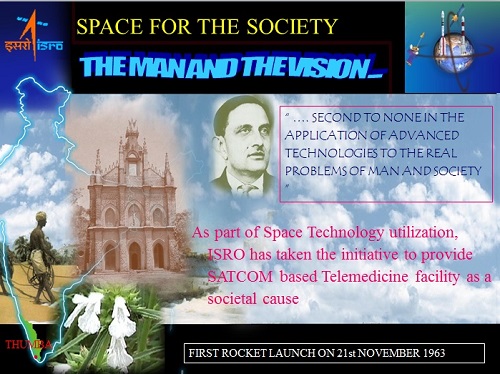 |
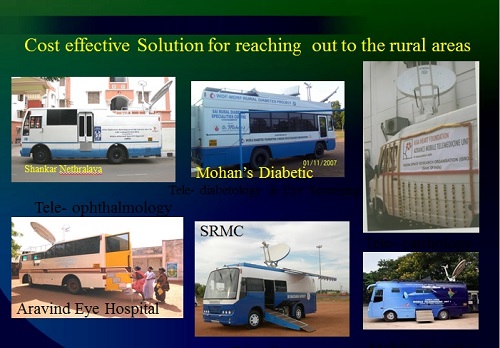 |
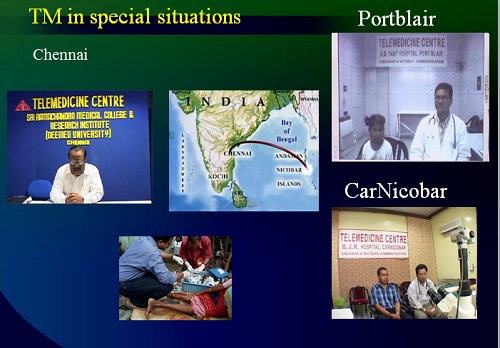 |
 |
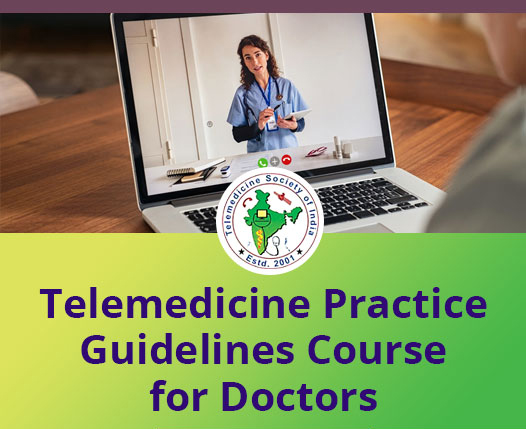
Telemedicine Practice Guidelines – A Foundation Course for RMPs by TSI
To know more about the Telemedicine Foundation Course click on the link below:
https://tsi.org.in/courses/
Feedback for Telemedicine Practice Guidelines Course
The foundation online course for Telemedicine Practice Guidelines being conducted by TSI has been taken up by almost 160 registered medical practitioners. The feedback of the course has so far been excellent. To view these feedbacks please visit – https://tsi.org.in/course-feedback/
A snapshot is presented a below:
1. Did you find the live interaction useful?
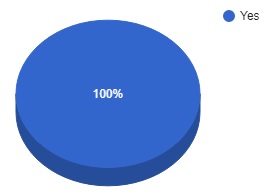
2. Were most of your doubts cleared regarding telehealth practice?
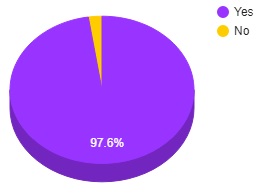
3. Do you feel more confident to practice safe telemedicine?
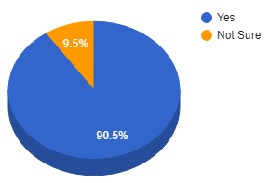
4. Overall rating
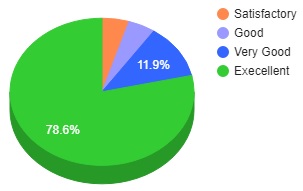
Telemedicine – News from India & Abroad
India
India launches incentive scheme supporting 75 startups in telemedicine and digital health
WHAT IT’S ABOUT The announcement comes as India celebrates its 75th year of independence from the United Kingdom. Amid the celebration, Science and Technology Minister Jitendra Singh said identifying and supporting the 75 startups is the ministry’s “most appropriate” task that will promote research and development in the healthcare sector… Read More
International
Artificial Intelligence (AI) Enhanced Through Brain Networks
Cognitive tasks can be performed efficiently using artificial intelligence (AI) networks based on human brain connectivity as per a study at the Mcgill University, published in the journal Nature Machine Intelligence… Read More
New AI Blood Test for Lung Cancer Detection
A novel artificial intelligence blood testing technology can detect over 90% of lung cancers in samples from nearly 800 individuals with and without cancer. ‘The DELFI technology blood test for lung cancer can be a good way to enhance screening efforts.’… Read More
Mobile telemedicine unit found to be effective in treating opioid use disorder in rural areas
Rural regions in the U.S. have been disproportionately affected by the opioid epidemic, while also having the fewest number of programs to treat opioid use disorder. In an effort to remedy this dire health issue, University of Maryland School of Medicine (UMSOM) researchers reconfigured a recreational vehicle (RV) as a telemedicine mobile treatment unit to determine whether it could provide effective screening and treatment to individuals with opioid use disorder in rural areas… Read More
TN – TSI invites all the TSI Chapters and Members to submit information on their upcoming Webinar or Events (50 words), News related to Telemedicine (200 words) or short articles (500 words) for the monthly e-newsletter.Guidelines for submission to TN TSI Newsletter-
|
Submission may be sent to – tsigrouptn@gmail.com
Editors reserve the rights for accepting and publishing any submitted material.
Editor in Chief – Dr. Sunil Shroff
Editors – Dr. Senthil Tamilarasan & Dr. Sheila John
Technical Partner- www.medindia.net

